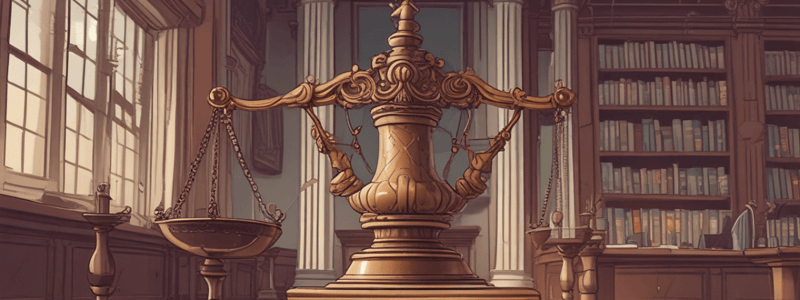Podcast
Questions and Answers
What is the main focus of Defamation as a tort?
What is the main focus of Defamation as a tort?
- Freedom of speech
- Financial compensation
- Interests in reputation (correct)
- Preventing physical harm
In a defamation case, what is the burden of proof for the claimant?
In a defamation case, what is the burden of proof for the claimant?
- Filing an injunction
- Proving the statement was defamatory and published (correct)
- Ensuring the statement is true
- Suing the defendant
What is the complete defense to the tort of defamation?
What is the complete defense to the tort of defamation?
- Offering financial compensation
- Obtaining an injunction
- Claiming freedom of speech
- Proving the statement is true (correct)
Which law applies in cases related to Defamation?
Which law applies in cases related to Defamation?
According to the Defamation Act 2013, who does it aim to offer clearer protection for?
According to the Defamation Act 2013, who does it aim to offer clearer protection for?
What aspect of defamation did S 11 DA specifically address?
What aspect of defamation did S 11 DA specifically address?
What is the limitation period for filing a defamation claim?
What is the limitation period for filing a defamation claim?
In a defamation case, what factor solely determines liability?
In a defamation case, what factor solely determines liability?
In which case was the defendant held liable for causing 'real and substantial distress' and 'harm' to reputation?
In which case was the defendant held liable for causing 'real and substantial distress' and 'harm' to reputation?
Which case established a new threshold that requires claimants to prove serious harm to their reputation?
Which case established a new threshold that requires claimants to prove serious harm to their reputation?
What test is determined by what 'right-thinking members of society' should think?
What test is determined by what 'right-thinking members of society' should think?
Which case discussed whether describing an actor as 'hideously ugly' is defamatory?
Which case discussed whether describing an actor as 'hideously ugly' is defamatory?
The Supreme Court in Stocker v Stocker (2019) emphasized that the interpretation of words should rely on:
The Supreme Court in Stocker v Stocker (2019) emphasized that the interpretation of words should rely on:
'Serious harm' must be proved as a threshold in which case according to Lord Justice Davis?
'Serious harm' must be proved as a threshold in which case according to Lord Justice Davis?
Which court unanimously rejected an appeal and held that serious harm needed to be proven as a matter of fact?
Which court unanimously rejected an appeal and held that serious harm needed to be proven as a matter of fact?
'How should words be interpreted?' is a discussion point in which case?
'How should words be interpreted?' is a discussion point in which case?
In defamation law, True (or legal) innuendo can be described as:
In defamation law, True (or legal) innuendo can be described as:
According to Tolley v JS Fry and Sons (1931), what made the amateur golfer's picture in an advertisement defamatory?
According to Tolley v JS Fry and Sons (1931), what made the amateur golfer's picture in an advertisement defamatory?
What was the outcome in Cassidy v Daily Mirror Newspaper Ltd (1929) regarding Mr. Cassidy's image with a young woman?
What was the outcome in Cassidy v Daily Mirror Newspaper Ltd (1929) regarding Mr. Cassidy's image with a young woman?
What is popular innuendo in the context of defamation law?
What is popular innuendo in the context of defamation law?
In Lewis v Daily Telegraph (1964), what led the courts to reject the chairman's defamation claim?
In Lewis v Daily Telegraph (1964), what led the courts to reject the chairman's defamation claim?
What distinguishes primary publishers from secondary publishers in defamation law?
What distinguishes primary publishers from secondary publishers in defamation law?
'Publication' in defamation law refers to:
'Publication' in defamation law refers to:
'Reference to claimant' in defamation cases involves:
'Reference to claimant' in defamation cases involves:
What was the outcome of the case Derbyshire County Council v Times Newspaper (1993)?
What was the outcome of the case Derbyshire County Council v Times Newspaper (1993)?
In the case Karpov v Browder (2013), why was the claimant not held liable for defamation by a UK-based investment fund manager?
In the case Karpov v Browder (2013), why was the claimant not held liable for defamation by a UK-based investment fund manager?
Which legal document can be invoked in a defamation action under UK law due to its incorporation in the Human Rights Act 1998?
Which legal document can be invoked in a defamation action under UK law due to its incorporation in the Human Rights Act 1998?
What did the case Steel and Morris v UK (2005) highlight as a breach of Art 10 of the ECHR?
What did the case Steel and Morris v UK (2005) highlight as a breach of Art 10 of the ECHR?
In the case Godfrey v Demon Internet (1999), why was the defendant held liable for defamation even though they were not the author?
In the case Godfrey v Demon Internet (1999), why was the defendant held liable for defamation even though they were not the author?
What was the ruling in Metropolitan International Schools Ltd v Designtechnica Corporation, Google UK and Google Inc (2009)?
What was the ruling in Metropolitan International Schools Ltd v Designtechnica Corporation, Google UK and Google Inc (2009)?
What did S 1 of the Defamation Act 1996 extend to operators of communications systems?
What did S 1 of the Defamation Act 1996 extend to operators of communications systems?
What makes cyber-defamation difficult in terms of identifying the maker of the statement?
What makes cyber-defamation difficult in terms of identifying the maker of the statement?
What is the main distinction between libel and slander?
What is the main distinction between libel and slander?
Which statement is true about special damage in defamation cases?
Which statement is true about special damage in defamation cases?
In defamation law, who are the words typically assessed to have an adverse effect on?
In defamation law, who are the words typically assessed to have an adverse effect on?
What is the significance of the Defamation Act 1952 regarding statements of incompetence?
What is the significance of the Defamation Act 1952 regarding statements of incompetence?
Under the Defamation Act 1962, what is required to establish defamation on the offending items in radio and television?
Under the Defamation Act 1962, what is required to establish defamation on the offending items in radio and television?
What is the key difference between libel under common law and current law as per the Defamation Act?
What is the key difference between libel under common law and current law as per the Defamation Act?
What implications does the Broadcasting Act 1990 have on defamation involving radio or television?
What implications does the Broadcasting Act 1990 have on defamation involving radio or television?
What standard was set by the House of Lords in Sim v Stretch (1936) regarding lowering reputation?
What standard was set by the House of Lords in Sim v Stretch (1936) regarding lowering reputation?




